Best Diet for Cockatiels: Essential Nutritional Guide
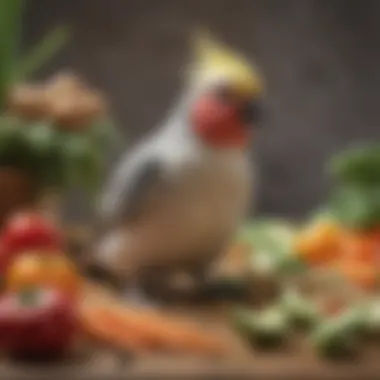
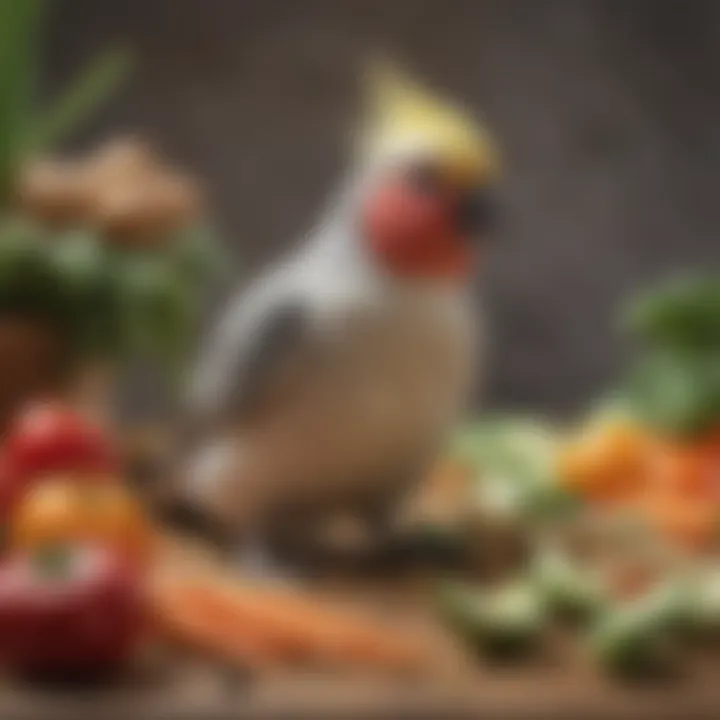
Intro
Understanding the dietary needs of cockatiels is crucial for their longevity and happiness. These small birds, known for their social behavior and charming personalities, thrive when provided with a balanced diet tailored to their unique needs. This guide will explore the essential nutrients, appropriate portion sizes, and variations in diet based on age and health status. By comprehensively covering these aspects, it aims to offer valuable insights for pet owners, helping them create a nutritious and satisfying diet for their feathered companions.
Understanding Your Pet
Pet Behavior Basics
Cockatiels are highly social animals. They bond closely with their human caretakers, often mimicking sounds and simple phrases. Understanding their behaviors helps in tailoring their diet. When a cockatiel is happy and comfortable, it is more likely to explore food options and experiment with various textures and flavors.
Common Breed Characteristics
Cockatiels are known for their distinctive crests and vibrant colors. While individual behaviors may vary, many cockatiels exhibit curiosity and playfulness. They generally require a mix of seeds, pellets, fruits, and vegetables to stay healthy. The breed’s playfulness can often lead them to prefer certain foods over others, making it important for owners to offer a variety.
Species-Specific Needs
Each species of cockatiel might have unique dietary requirements. Most commonly kept cockatiels need a balanced mix. Seeds alone can lead to nutritional deficiencies. A combination of high-quality pellets and fresh produce is essential for their overall well-being. Incorporating these elements ensures they receive vitamins and minerals necessary for their health.
Feeding Guidelines
Providing the right proportions of food is essential. A typical diet should consist of:
- Pellets: 60-70% of the diet for daily feeding.
- Seeds: 20-30%, offered as a treat rather than the main food.
- Fruits and vegetables: 10-15%, fresh and varied to maintain interest.
Ensure that the food is fresh and clean. Avoid feeding cockatiels any spoiled or moldy items, as this can lead to serious health issues.
Grooming Essentials
Regular grooming is important to keep cockatiels in good shape. While they can preen themselves, owners should schedule occasional baths to help with feather maintenance. Some owners use misting techniques to simulate rain, which cockatiels often enjoy.
Hygiene Practices
Maintaining cleanliness in the bird’s environment is vital. Change the cage lining daily and ensure food and water bowls are cleaned regularly. This helps prevent illnesses. Keeping perches and toys clean can also reduce the risk of infections.
Health and Wellness
Routine Vet Check-ups
Cockatiels should have regular veterinary check-ups. It ensures that any potential health issues are addressed early. These check-ups can help spot any dietary deficiencies.
Vaccination Needs
While cockatiels may not need standard vaccinations like dogs and cats, consulting with a vet regarding specific vaccinations based on the bird's environment is wise. Vaccinations can protect them from common avian diseases.
Recognizing Signs of Illness
Birds are often skilled at hiding illnesses. Key signs to watch for include changes in appetite, drooping wings, or unusual vocalizations. Early detection by noticing these signs can significantly affect recovery outcomes.
Enrichment and Activities
Indoor vs.
Outdoor Activities
Providing a stimulating environment for cockatiels is essential. Indoor activities can include training sessions or providing new toys, while outdoor activities under supervision can introduce fresh air and new stimuli.
Interactive Toys and Games
Introduce interactive toys to engage your birds. Simple foraging toys can encourage natural behaviors and keep them mentally active, ensuring a healthier mindset and improved overall health.
Socialization Opportunities
Cockatiels are social birds. Regular interaction promotes a healthier mental state. Spend time playing and talking to your cockatiel, as socialization is key to their happiness.
A cockatiel’s well-being is directly linked to its diet and environment. A dieta that lacks essential nutrients can lead to varied health issues down the line.
By understanding your cockatiel’s needs, you can create a holistic approach to its diet, ensuring that your feathered friend leads a fulfilling and healthy life.
Understanding Cockatiel Nutrition
Understanding the nutritional needs of pet cockatiels is essential for their overall health and well-being. Proper nutrition is not just about feeding them; it's about offering a balanced diet that meets their specific needs based on age, activity level, and individual health conditions. This section provides a foundation that supports their physical and mental welfare.
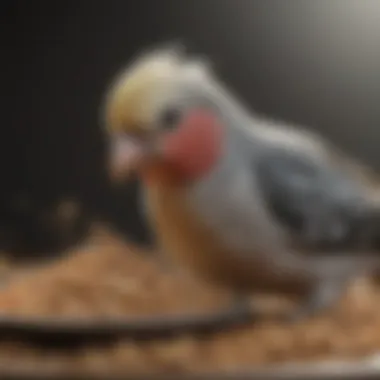
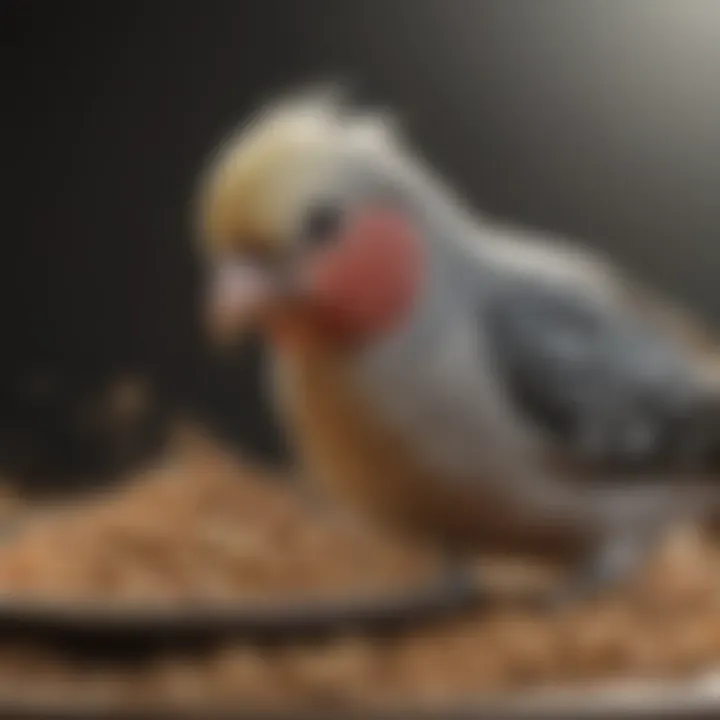
Basic Nutritional Needs
Cockatiels, like all birds, require a variety of nutrients to thrive. Their diet should include essentials such as proteins, fats, carbohydrates, vitamins, and minerals. Each nutrient plays a key role:
- Proteins: Important for feather health, muscle development, and overall growth. Sources include high-quality pellets, nuts, and legumes.
- Fats: Necessary for energy and maintaining body temperature. Avocados are harmful, but small amounts of sunflower seeds and healthy oils can be beneficial.
- Carbohydrates: They should be obtained mostly from grains and seeds, which provide necessary energy for daily activities.
- Vitamins and Minerals: Vital for immunity, bone health, and metabolic functions. Fresh fruits and vegetables serve as excellent sources.
Many cockatiel owners may wonder about the right food proportions. A common recommendation is that pellets should make up about 70-80% of their diet, while seeds, vegetables, and fruits cover the remainder. Understanding these basic nutritional needs allows owners to craft a suitable diet plan while ensuring their pets receive all necessary nutrients.
Importance of Variety in Diet
Variety is crucial when it comes to the diet of cockatiels. Offering a limited selection can lead to nutritional deficiencies, which can affect their health over time. A diverse diet keeps your bird satisfied and engaged. It also encourages natural foraging behavior, which is important for their mental stimulation.
Including a variety of foods ensures that cockatiels receive a well-rounded intake of nutrients. Some benefits of a mixed diet include:
- A wider range of essential vitamins and minerals.
- Enhanced immune function due to nutrient diversity.
- Reduced risk of boredom and subsequent behavioral issues.
A balanced diet might look like this:
- Pellets: 70-80%
- Seeds: limited, as a treat
- Fresh vegetables: daily selection, such as spinach, carrots, and bell peppers
- Fruits: offered in moderation, including apples and berries
In summary, providing a variety of foods contributes significantly to the health, happiness, and longevity of cockatiels. Remember, a well-fed cockatiel is a happy cockatiel.
Main Components of a Cockatiel Diet
Understanding the main components of a cockatiel's diet is crucial for ensuring the health and well-being of these birds. A well-structured diet not only helps in maintaining a balanced nutrient intake but also contributes to behavioral enrichment. It is vital to consider different food types and their respective benefits to create a diverse and satisfactory feeding routine for your cockatiel. Incorporating various food sources can help prevent dietary deficiencies that may arise from relying on a single type of food.
Pellets: The Mainstay
Pellets are often recommended as the primary source of nutrition for cockatiels. They are formulated to provide a balanced diet that includes essential vitamins, minerals, and nutrients. Unlike seeds which can be high in fat and low in other nutrients, pellets are designed to meet the specific dietary needs of cockatiels. When selecting pellets, it is important to choose high-quality brands that do not contain artificial colors or fillers. Look for products that use whole grains and are specifically labeled for cockatiels.
Regularly replacing pellets ensures freshness, and it is good practice to keep the feeding area clean. While some cockatiels may be resistant to new foods, gradual mixing of pellets with seeds can help transition them to a pellet-based diet without causing distress.
Seeds: A Supplementary Option
Seeds can be included as part of a cockatiel's diet, but they should not be the primary source of nutrition. They are energy-dense and can lead to obesity if fed in excess. Some common seed types include canary seed, millet, and sunflower seeds. Sunflower seeds, in particular, should be offered sparingly due to their high fat content.
Instead of solely relying on seeds, consider using them as a treat or motivation for training. Mixing seeds with pellets can also encourage acceptance of more nutritious options. Always observe the cockatiel's weight and behavior, adjusting seed portions based on their overall health.
Fresh Fruits and Vegetables
Introducing fresh fruits and vegetables into a cockatiel's diet is essential for meeting their need for antioxidants and additional vitamins. Variety is key here; some good options include carrots, spinach, apples, and berries. Ensure that any fruits and vegetables are thoroughly washed and chopped into manageable sizes to prevent choking.
Fruits should be offered in moderation due to their sugar content, while dark leafy greens are excellent sources of nutrients. It is advisable to introduce new foods slowly, watching for any adverse reactions. Fresh produce not only enhances a cockatiel’s diet but can also serve as an engaging activity, promoting natural foraging behaviors.
A balanced diet contributes significantly to the overall health and mood of your cockatiel.
Specific Dietary Requirements
Understanding the specific dietary requirements for cockatiels is crucial for their overall health. These requirements shift based on life stages, including growth, breeding, and aging. Catering to these varying needs ensures that cockatiels receive the right balance of nutrients to thrive. Health issues often arise from imbalanced diets, and recognizing these dietary changes can prevent such problems.
Diet for Growing Cockatiels
Growing cockatiels have unique nutritional needs that support their rapid development. At this stage, their diet must provide sufficient protein and energy to support muscle growth and development of feathers. A diet rich in high-quality pellets designed for young birds forms the base of their nutritional intake. Additionally, incorporating fresh fruits and vegetables adds necessary vitamins and minerals.
Important food options include:
- Cooked beans
- Quinoa
- Leafy greens like kale and spinach
Young cockatiels often explore their food, so varying textures can encourage them to eat more. Additionally, hydration is key. Fresh, clean water should always be available, checking regularly for any contamination.
Diet for Breeding Cockatiels
Breeding cockatiels require special care in their diet to support reproduction. Nutritional preparation before breeding is vital. Diets high in protein, calcium, and healthy fats are essential during this period. Protein sources such as cooked eggs or high-quality pellets play a significant role in egg production and chick development.
Foods rich in calcium should not be overlooked. Options include:
- Cuttlebone
- Mineral blocks
- Dark leafy greens
Grooming their diet requires balance. Overfeeding can cause health issues, and monitoring portion sizes is crucial. Providing a mixture of seeds and specialized breeding pellets fosters a balanced nutritional profile. Regular vet check-ups are also advised to ensure the health of both the parents and their chicks during this crucial time.
Diet for Aging Cockatiels
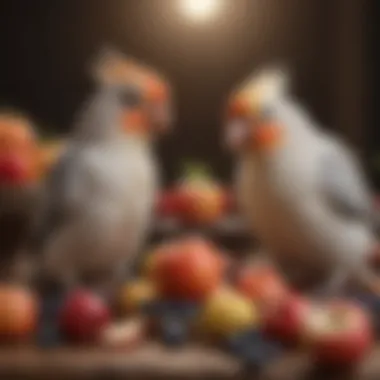
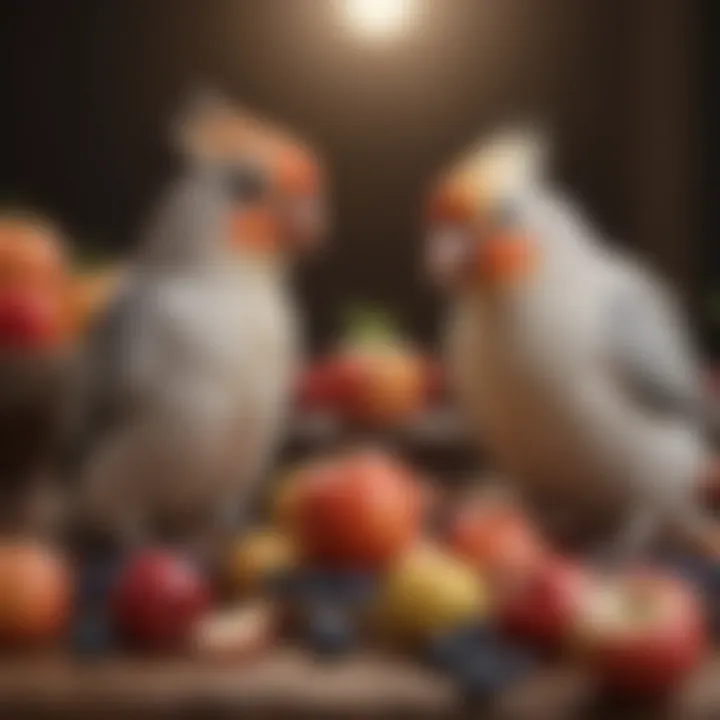
As cockatiels age, their nutritional needs change. Older cockatiels may become less active, requiring a diet that focuses on maintaining health without contributing to weight gain. Pellets should still comprise a base, but it's important to choose ones designed for elderly birds. These often have lower fat and improved calcium content.
Adding easily digestible foods can aid their dietary transition. Soft fruits like apples and bananas are good options.
Consider these elements:
- Hydration: Elderly cockatiels may forget to drink. Regularly refreshing water and offering hydrating fruits can help.
- Health Monitoring: Changes in eating habits can indicate health issues. Keeping an eye on changes is essential.
Adjustments throughout life are normal. Observing their behavior and making necessary changes is critical to ensure a long and healthy life.
Always consult with an avian vet to fine-tune dietary needs based on individual circumstances and any existing health conditions.
Common Dietary Mistakes
Cockatiel owners often make mistakes with their pets' diets, which can significantly affect their health. It is essential to identify and rectify these common dietary mistakes to ensure that cockatiels receive a balanced and nutritious diet. By understanding these pitfalls, pet owners can make informed choices that contribute to their birds' long-term well-being.
Overreliance on Seeds
Seeds are often viewed as a primary food source for cockatiels. It may seem natural to provide seeds since many birds enjoy them. However, seeds alone lack essential nutrients required for optimal health. Cockatiels may become addicted to the taste of seeds, making it difficult for them to accept other food types if introduced later. This can lead to nutritional deficiencies that manifest through various health issues.
A diet too high in seeds can result in obesity, as seeds are often high in fat. Moreover, seeds typically lack certain vitamins and minerals that are vital for a cockatiel's development and longevity. It is crucial to limit seed intake and instead provide a more balanced selection of food. This should include high-quality pellets, fruits, and vegetables. Trying to introduce pellets early can help cockatiels develop a taste for them while limiting seed consumption.
Neglecting Fresh Produce
One of the most serious mistakes is ignoring the significance of fresh fruits and vegetables in a cockatiel’s diet. Fresh produce is a rich source of vitamins, minerals, and antioxidants, which are critical for maintaining health. Many owners may not realize that neglecting fresh produce can deprive their birds of necessary nutrients.
An effective approach is to gradually introduce fresh fruits and vegetables to your cockatiel’s diet. Of course, it is important to ensure that the produce is safe for consumption. Some safe options include carrots, leafy greens, and apples. Avoid giving produce like avocado, which is toxic to birds.
Encouraging variety in fresh produce can also stimulate a cockatiel’s appetite and promote healthy eating habits. It is advisable to rotate different types of fruits and vegetables regularly to prevent boredom.
Cockatiels thrive best on a diet that encompasses various food sources, including pellets, seeds, fruits, and vegetables.
By being mindful of these dietary mistakes, pet owners can foster a healthier and happier environment for their cockatiels.
Hydration Needs
Proper hydration is essential for overall health and well-being of cockatiels. While the focus tends to be on food, water often receives less attention. However, understanding and addressing the hydration needs of cockatiels is crucial for their diet and longevity. Inadequate water intake can lead to serious health issues, including kidney problems and dehydration. Thus, ensuring that cockatiels have access to clean and fresh water every day cannot be overstated.
Importance of Fresh Water
Fresh water plays a pivotal role in many bodily functions. Cockatiels, like all birds, are made up of a large percentage of water. Essential processes such as digestion, nutrient absorption, and temperature regulation depend on proper hydration.
Removing stale or contaminated water can help prevent bacterial growth and ensure their drinking supply remains healthy. Cockatiels may vary in their water consumption depending on their diet, activity level, and environmental conditions. Therefore, providing fresh water continuously encourages them to drink enough, which is vital for maintaining their internal balance.
Moreover, offering fresh water encourages engagement with their environment. Birds are naturally curious. Installing a small water bowl in their cage or using water bottles with a sipper tube can stimulate their instincts to drink water. Regularly changing the water and ensuring it is clean is an integral part of cockatiel care.
Remember: Clean and fresh water is just as critical as a nutritious diet for maintaining the health of cockatiels.
Water Management Tips
Managing water effectively for cockatiels is a straightforward yet important task. Here are several tips to ensure they stay hydrated:
- Regular Changes: Change the water twice a day, especially in warmer weather. This helps prevent contamination and keeps the water inviting.
- Use Proper Containers: Opt for shallow water dishes that are easy for cockatiels to access. Avoid very deep containers that may pose drowning risks.
- Monitor Water Intake: Observe how much water your cockatiel drinks. If you notice a sudden change in their water consumption, it could be a sign of health issues, which may require veterinary attention.
- Consider Water Features: If possible, use water fountains for birds that keep water circulating. Birds are attracted to moving water, which can encourage drinking.
- Add Nutritional Supplements Wisely: If required, consult an avian veterinarian about adding vitamins or minerals to water. However, ensure the water remains clear and clean.
Understanding the hydration needs of cockatiels is not merely a routine task but a critical aspect of their well-being. With diligent attention to their water supply, pet owners can significantly enhance their cockatiels' health and happiness.
Food Presentation and Accessibility
Food presentation and accessibility are vital components in ensuring the overall health and satisfaction of your cockatiel. By considering how food is presented and making it easily accessible, you can significantly impact your bird's eating habits and nutritional intake. Proper food presentation encourages natural foraging behaviors and can reduce waste.
Ideal Feeding Practices
Establishing ideal feeding practices is essential for creating a positive feeding environment for cockatiels. Here are some key aspects to consider:
- Consistent Feeding Times: Stick to a regular feeding schedule to provide structure for your cockatiel. Birds thrive on routine.
- Clean Feeding Dishes: Always use clean dishes to prevent bacteria buildup, which can harm your cockatiel.
- Introduce Variety: Rotate different fruits, vegetables, and pellet types regularly to keep your bird interested in its diet.
- Observe Portion Sizes: Ensure you are giving appropriate portion sizes, which can reduce food waste and encourage your bird to eat a balanced diet.
- Use Foraging Toys: Incorporate foraging toys that encourage your cockatiel to work for its food. This simulates natural behaviors and can be mentally stimulating.
By implementing these practices, you create an engaging feeding experience that promotes optimal health.
Evaluating Food Placement
The placement of food is equally critical as how it is served. Cockatiels are socially interactive birds and their feeding setup should cater to their behavioral needs:
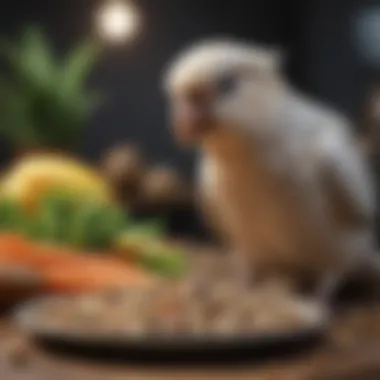
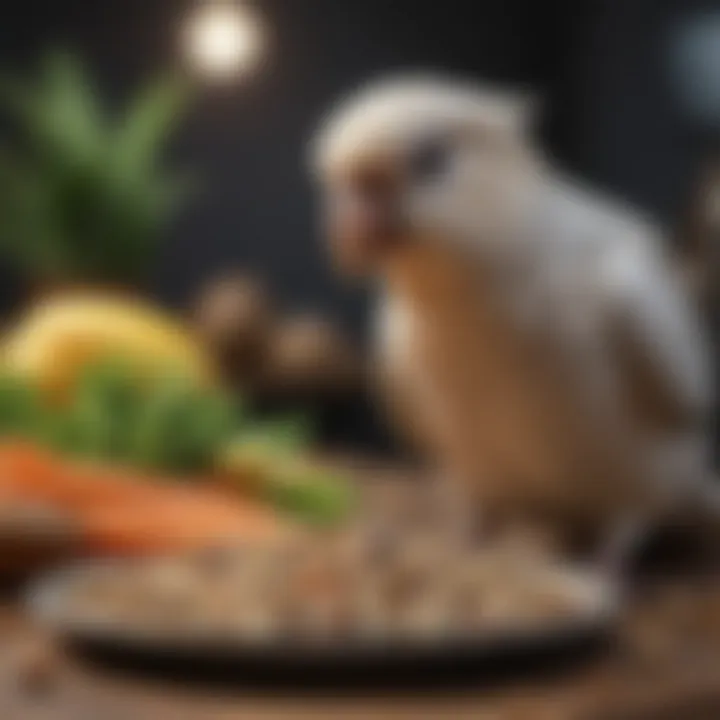
- Accessible Locations: Ensure that food dishes are easy to reach but not so low that they feel vulnerable while eating.
- Multiple Feeding Stations: If you keep several birds, having multiple feeding stations can reduce competition for food and allow each bird to eat comfortably.
- Visible Placement: Place food in areas where your cockatiel feels safe, such as near perches or platforms. They should have a clear view of their surroundings while they eat.
- Safety Considerations: Avoid placing food near areas where the cockatiel can be startled easily. This includes areas close to doors or heavy foot traffic.
Understanding Nutritional Labels
Understanding nutritional labels is vital for anyone caring for cockatiels. This section aims to clarify what to look for on food packaging. It lays down the groundwork for making informed choices about your bird's diet. The right food can prevent health issues and promote overall well-being.
Decoding Ingredients
When looking at any pet food label, the ingredient list is the first place to focus. It usually lists components by weight, from the most prevalent to the least. For cockatiels, you should prioritize feeds with whole grains, seeds, and nutritious additives like vegetables and fruits.
Avoid products that list fillers such as corn or wheat as primary ingredients. These do not provide significant nutritional benefits. Instead, look for specific ingredients such as millet, oats, and quinoa. These ingredients ensure your cockatiel receives adequate protein, fiber, and essential fatty acids.
Understanding the terms on labels can also help you discern the quality of ingredients. Phrases like “natural” or “premium” are not always regulated, meaning they might not signify anything substantial. Therefore, be proactive in researching the brands you choose or asking for recommendations from veterinarians.
Nutritional Composition of Cockatiel Food
The nutritional composition of cockatiel food is essential to ensuring a balanced diet. Each manufacturer provides a guaranteed analysis, highlighting key nutrients such as protein, fat, and fiber content. For cockatiels, a diet should generally comprise of:
- Protein: 12-20%
- Fat: 4-8%
- Fiber: 5-10%
Protein helps in muscle development and feather health. It's important to note how this varies among brands. Look for foods high in digestible proteins.
Moreover, vitamins and minerals listed should include Vitamin A, D3, calcium, and phosphorus. These nutrients are necessary for skin, feather, and overall skeletal health. For optimal health, it is advisable that you also provide supplements if the primary food lacks these elements.
Tip: Read multiple product labels to compare the nutritional composition. This can guide you to make the best choice for your cockatiel’s specific needs.
In summary, a thorough understanding of nutritional labels empowers pet owners to make informed dietary decisions for their cockatiels. This knowledge can lead to healthier, happier birds.
Consulting with Avian Veterinarians
Consulting with avian veterinarians is crucial for any pet owner aiming to provide optimal care for their cockatiels. These professionals specialize in avian health and nutrition, which ensures that your cockatiel receives tailored advice based on its unique needs. Many owners may overlook this aspect, assuming that general veterinarians possess adequate knowledge for birds. However, the reality is that avian veterinarians are adept in the complexities of bird care, making their guidance indispensable.
When you consult with a veterinary expert, you can discuss specific dietary needs. For instance, these specialists can recommend the best brands of pellets, seeds, and fresh produce that promote longevity and vigor in your cockatiel. They understand the intricacies of avian nutrition, including optimal nutrient ratios. Having such insights can help avoid common mistakes that sometimes lead to health issues.
Additionally, veterinarians can assist in evaluating any existing dietary habits of your cockatiel and suggest modifications. Many pet owners are unsure how to transition their birds to a healthier diet. Professionals can provide strategies to encourage cockatiels to accept new foods, ensuring a smoother transition. The benefits of consulting with an avian veterinarian are numerous, ranging from personalized dietary recommendations to guidance on maintaining overall well-being.
Consulting with avian veterinarians is not just a wise choice; it is an essential step in ensuring your cockatiel's health and happiness.
The Role of Veterinary Guidance
Veterinary guidance plays a vital role not only in nutrition but in the overall health management of your cockatiel. Avian veterinarians can perform thorough health assessments that can detect underlying issues affecting your bird’s appetite or behavior. Many health problems can alter feeding habits, leading to insufficient nutrition or overfeeding.
Through routine check-ups, veterinarians can spot deficiencies or excesses in diet, allowing you to adjust feeding practices. They may suggest supplements when necessary to enhance your cockatiel’s diet, ensuring it is getting all essential vitamins and minerals. The role of veterinary guidance extends to monitoring the bird’s weight and adapting its diet accordingly, especially during different life stages or if health issues arise.
Moreover, these professionals often stay updated with the latest research and advances in avian nutrition. As a result, they can provide cutting-edge advice that might not be available through general resources. Their informed perspective can assist significantly in enhancing the life quality of your cockatiel.
Regular Nutritional Assessments
Regular nutritional assessments are key to maintaining your cockatiel's health. During these evaluations, avian veterinarians look at various factors, including body weight, feather quality, and energy levels, all indicators of how well your bird is thriving on its current diet.
In these sessions, the vet can observe if your cockatiel is receiving a balanced and nutrient-rich diet. They may suggest adjustments based on seasonal changes, activity levels, or health changes. Regularly scheduled assessments allow for timely interventions, which can prevent long-term dietary issues from becoming severe health concerns.
Tracking your cockatiel’s condition over time provides you and your vet a clearer picture of its nutritional status. Keeping records of their assessments can also help in identifying trends in appetite or weight changes. Such monitoring is invaluable for fostering a responsive approach to your bird's dietary needs, ensuring that any potential problems are addressed proactively.
In summary, consulting with avian veterinarians should be an integral part of your cockatiel care plan. Whether through customized nutritional guidance or ongoing assessments, their expertise in avian health can help you navigate the complexities of feeding your feathered friend effectively.
Next Steps for Optimal Cockatiel Care
Caring for cockatiels involves more than just providing food. It requires a thorough understanding of their dietary needs and ongoing evaluations of their health. This section emphasizes the importance of structured approaches to diet and health monitoring. By focusing on these areas, pet owners can foster a comfortable and nourishing environment for their feathered friends.
Creating a Balanced Meal Plan
A balanced meal plan is critical for the well-being of cockatiels. Such a plan should integrate various food types to ensure they receive essential nutrients. A typical balanced meal plan includes:
- High-quality pellets as the main food source
- Small amounts of seeds for variety and enrichment
- Fresh fruits and vegetables introduced regularly to provide vitamins and minerals
When formulating the meal plan, portion control is essential. Overfeeding can lead to obesity, while underfeeding may result in malnutrition. It is advisable to consult product labels to determine the recommended serving sizes tailored for cockatiels. Regular rotation of fruits and vegetables ensures exposure to different nutrients. Be cautious with foods like avocado or chocolate, which are toxic to birds.
Consider also environmental factors such as seasonal availability of fresh produce. Introduction of new foods should be gradual to avoid digestive issues. Monitoring how your cockatiel reacts to changes in their meal plan will guide future adjustments.
Monitoring Health and Behavior
Monitoring your cockatiel's health and behavior is as vital as dietary planning. Birds can be adept at hiding their illnesses, making regular observation necessary. Here are some key aspects to focus on:
- Weight Checks: Regular weighing helps identify sudden weight changes, which may indicate health issues.
- Feather Condition: Shiny, clean feathers indicate good health, while dull or missing feathers may signal problems.
- Behavioral Changes: Changes in activity levels, vocalization, and social interaction can provide early warning signs.
Adequate attention to these factors can help in early detection of health concerns. If irregularities are noted, it is prudent to consult an avian veterinarian promptly. Keeping a record of your cockatiel's diet and behaviors can assist in identifying patterns and deviations, allowing for timely interventions.







